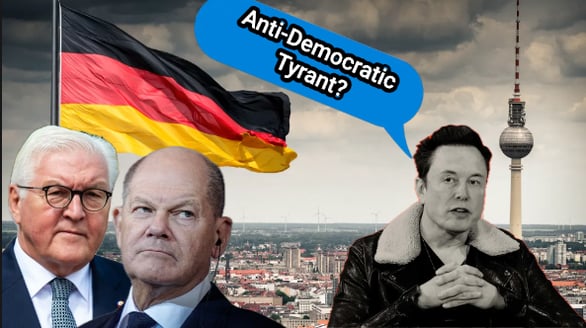Elon Musk's German Election Gambit: Interference or Free Speech?
Elon and X are at it again.
SITG NEWS DEEP DIVE BLOG
1/7/20252 min read


Tech Titans and Political Turmoil: Musk, Vance, and the German Election
The recent German federal election has become a focal point of international debate, particularly due to the involvement of prominent American figures like Elon Musk and Vice President-elect JD Vance. Their commentary and endorsements have sparked controversy and raised critical questions about foreign influence in national elections.
👉 Click here to see it on YouTube https://youtu.be/pL6QOjrNaT8 👈
Support the Standing in the Gaps GoFundMe: https://gofund.me/af0944d3
Musk's Bold Endorsement
Elon Musk, the CEO of Tesla and owner of X (formerly Twitter), openly endorsed the far-right Alternative for Germany (AfD) party, declaring, "Only the AfD can save Germany". Musk further described the AfD as "the last spark of hope for this country". His endorsement is reportedly based on the party's positions on key issues such as economic recovery, energy supply, and migration control. Many critics view this as an overt attempt to sway political sentiment in Germany.
Additionally, Musk’s public statements have extended beyond mere political endorsement:
He launched personal attacks on high-ranking German officials, referring to the German President as an “anti-democratic tyrant” and the German Chancellor as a "fool".
He has been vocal about his disapproval of Germany’s immigration policies, labeling the government's approach as "suicidal empathy".
Vance's Nuanced Stance
While JD Vance, the US Vice President-elect, has not explicitly endorsed the AfD, he entered the debate by calling Musk's article in Welt am Sonntag "interesting". Vance clarified that he is not endorsing any specific political party in Germany, emphasizing respect for German sovereignty and a desire to maintain good diplomatic relations.
Despite not offering outright support for the AfD, Vance made notable remarks:
He highlighted the AfD's regional popularity, particularly in areas that historically resisted the Nazi regime. He pointed out the irony of American media labeling the AfD as "Nazi-lite" given this context. However, Vance’s argument lacks supporting evidence, as the AfD has also gained significant traction in regions where the NSDAP had strong historical support. For example, in Thuringia, the AfD recently secured 32.8% of the vote, a region where the NSDAP won state elections in 1932.
Vance’s comments, though measured, have been interpreted as sympathetic to Musk’s stance, thereby amplifying the controversy.
Reactions and Repercussions
Musk's endorsement and statements have triggered strong backlash from German politicians and the broader public. Critics accuse Musk of meddling in domestic affairs, with some labeling his actions as "undignified" and "problematic". The German government has reiterated its stance that elections are a domestic matter, underscoring the importance of safeguarding national sovereignty.
Key points of contention include:
Legal implications: There is ongoing debate over whether Musk’s statements could be classified as defamatory under German law.
Concern over influence: German officials have voiced apprehension regarding Musk’s potential to exert undue influence through his corporate ventures and social media presence.
Broader Implications
The involvement of Musk and Vance in the German election underscores several critical issues:
International influence in national politics: The extent to which foreign personalities should engage in another country’s electoral process remains a contentious issue.
Freedom of speech versus national sovereignty: The debate around balancing free expression with respect for national sovereignty has intensified.
The role of social media in political discourse: Musk’s use of his platform to promote political views has reignited concerns about the power of tech moguls in shaping public opinion.
Conclusion
The German election has evolved into a battleground for broader debates about tech titans, political endorsements, and the limits of free speech in a globalized world. The contrasting yet impactful perspectives of Elon Musk and JD Vance have added complexity to Germany’s political landscape, highlighting the delicate interplay between international commentary and domestic politics.
